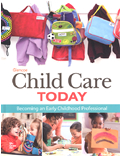
Child Care Today ©2012Chapter 10: Quality Early Childhood ProgramsChapter SummaryA program philosophy describes the general beliefs, concepts, and attitudes a child care program has about how children learn. Program goals identify basic skills, concepts, and attitudes to develop and encourage in children. Curriculums reflect the philosophy and program goals. Programs can be for-profit or nonprofit, and program sponsors vary in their operating purposes. Programs can include child care centers, family child care homes, before- and after-school child care, preschools and nursery schools, public school prekindergarten, employer-sponsored centers, in-home child care, intergenerational care centers, child care for mildly ill children, back-up child care centers, Head Start preschools and child care centers, Montessori preschools, preschools and child care for children with special needs, crisis nurseries, parent cooperatives, laboratory schools, and kindergarten. Early childhood programs must meet specific requirements before they are allowed to operate. Each state has its own licensing laws. Meeting these laws is mandatory. In some states, certain types of programs are license exempt. Some states require registration rather than formal licensing. Licensing usually addresses minimum standards in certain areas of program operation. Legal duties for programs include required information on enrollment forms, nonbiased enrollment practices, ensuring privacy and confidentiality, and fee agreement contracts. You must comply with laws and report unresolved problems. Accreditation from professional organizations assures that programs operate according to recognized professional practices. Accreditation is voluntary. Directors recruit, interview, and hire to maintain the best staff possible. Each staff position has a job description. Organized staffing plans identify supervisors and staff members. Directors are responsible for screening staff before employment. Quality facilities must be kept in good physical shape. In many programs, an advisory or governing board helps manage the program. Directors interact with the public through program enrollment, parent or family handbooks, family involvement, and community referrals. Yearly budgets and cost control are part of financial management. Public relations include community outreach, being a reliable source of information for the community, and professional organization memberships. Programs must undergo a variety of inspections and evaluations to ensure quality. |  |















